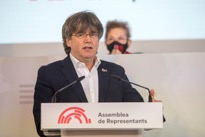
After years of discrediting him, interim president Pedro Sánchez is now negotiating with Puigdemont. For the time being, in order for the PSOE to gain control of the Spanish congressional table, Puigdemont demanded that Sánchez initiate procedures to make Catalan official in EU institutions (along with Basque and Galician) and so that it could also be used in Congress.
Until now, when a member of parliament tried to speak Catalan in Congress, they were forced to express themselves in Spanish under threat of reprisals. How is it possible that they would ban the language of the Catalans? Language is not only communication, but above all identity. This made us feel that "our" state does not respect our identity.
In Europe, in many countries, only one language per state is conceived. Other "regional" languages are known, but they are not taken into account, as if their speakers were second-class citizens. In Spain, 26M people live in territories that have Castilian (the language of Castile) as their own language, but 14M live in territories that have Catalan as their own language (with about 8M regular speakers), 3M Galician (2M speakers) and 3M Basque (900,000 speakers).
And Catalan is not a secondary language that has coexisted with Spanish in the same territory. Catalan is the indigenous language of a part of the Iberian Peninsula (the cultural nation called Països Catalans) which was part of the Crown of Aragon and which was confederated, on an equal footing, with the Crown of Castile in 1474. But in 1714 it was subjugated by force and all its rights abolished, so that from then on, we consider Catalonia to be a colony of Spain. From this annexation by force comes the historical meaning of the movement for the independence of Catalonia.
It has also been Spain that has prevented Catalan from becoming official in EU institutions, because it wants to subordinate us to Spanish. Catalan (which is used in: Spain, France, Italy and Andorra - where it is the state language -) is the ninth most spoken language in the EU, but it has no official status. By contrast, languages with fewer speakers are official: Bulgarian, Danish, Slovak, Finnish, Lithuanian, Latvian, Slovenian, Estonian, Maltese and Irish Gaelic.
We Catalans are very clear that this request to the EU only responds to the interest of pro-independence votes, so Puigdemont demands, in order to continue negotiating, a fait accompli at the EU Council meeting on 19 September, which will take place with the Spanish presidency. To date, all the proposed languages have been accepted, and the Spanish government is not expected to put obstacles in the way, as it has done so far, because it would force Junts to vote against and force new elections.
These would be the sixth elections in eight years, a period in which, theoretically, only two elections were due. This is already a sign of the political and economic instability affecting the Spanish state for not wanting to confront the conflict with Catalonia in a democratic way with a referendum on self-determination.





